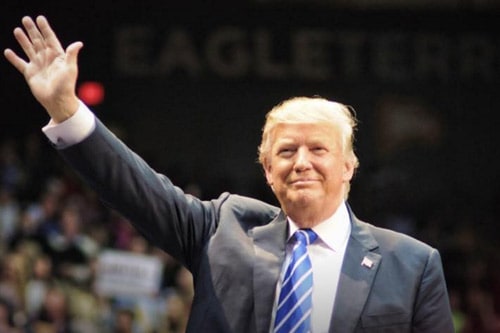
President Trump has sent a $4.75trn annual budget proposal to Congress that includes cuts to spending on Medicare and Medicaid, as well as a raft of measures aimed at reducing spending on medicines.
The headline elements are a 5% increase in budget for the military and of course an $8.6bn request for funding of Trump’s wall along the border with Mexico, alongside plans to trim spending on Medicare by $818bn and Medicaid by $1.5trn over the next 10 years, which critics say goes back on a previous pledge to leave them intact.
Democrats swiftly attacked the proposals, focusing on the cuts to health services and social security – set to be trimmed by around $25bn – as an attempt to balance Trump’s tax concessions to the wealthy by taking benefits away from poorer people.
The document is a proposal only with no legal weight, and is generally dramatically altered by Congress. Nevertheless, it is a signal of intent from the US administration and contains a number of elements that will prick up the ears of the biopharma industry.
The budget proposes removing the cap on Medicaid manufacturer drug rebates “to ensure rebates reflect all price increases for a drug,” and would also prevent manufacturers from using authorised generics to lower their rebate obligations whilst cracking down on companies that “use the regulatory framework to hinder competition.”
Medicaid programmes would be able to operate closed formularies and negotiate prices directly with manufacturers under the plans, and the current system of open-ended federal spending would be replaced with a system of ‘block grants’ for states tied to Medicaid reforms – something that has already been defeated by Congress in the past.
The plans would also eliminate the Affordable Care Act’s Medicaid expansion, which has extended coverage to 12m low-income adults in the US, and take coverage away from adults if they don’t meet work requirements.
There are also measures aimed at reducing out-of-pocket costs, including the introduction of a spending cap for Medicare beneficiaries. The document doesn’t detail the threshold level, but the government’s payment of the above-cap amount has been costed at around $14bn. The budget would also cap payment for Part B drugs to the consumer price index, which rises more slowly than inflation in the healthcare sector.
Among other proposals is reform of the 180-day exclusivity rule for first-to-market generics, tightening up the rules on new chemical entities “to ensure that only truly innovative new drugs receive an additional five years of exclusivity”, and blocking abuse of the FDA petition process “when circumstances indicate that the primary purpose of the petition is to delay FDA approval” of a generic.
Away from drug pricing, the budget includes an increase in funding for HIV programmes, a 12.6% drop in funding for the National Institutes of Health (NIH) which is likely to see stiff bipartisan opposition, and allocates $6.1bn to the FDA, a rise of $643m.
At a White House press conference Office of Management and Budget (OMB) Acting Director Russell Vought insisted that Trump “is not cutting Medicare in this budget. Medicare spending will go up every single year by healthy margins, and there are no structural changes for Medicare beneficiaries.”
The Biotechnology Innovation Organization (BIO) President and CEO Jim Greenwood said his organisation applauded the President’s efforts to reign in out-of-pocket costs for patients, he said other measures would hit the most needy.
“We have serious concerns that elements of this proposal threaten to harm some of the nation’s most vulnerable patients, including seniors and low-income families. The budget would fundamentally upset the successful Medicare drug benefit that has provided American seniors with affordable prescription drug coverage while costing taxpayers less than originally expected. “
“This includes a proposal to increase out of pocket costs for patients in the coverage gap who rely upon brand name drugs. We are also concerned that proposed changes to Medicaid could limit beneficiary access to needed cures and treatments.”




